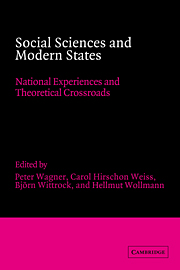Book contents
- Frontmatter
- Contents
- Acknowledgements
- Notes on contributors
- Part I National experiences in comparative perspective
- 1 The policy orientation: legacy and promise
- 2 Social science and the modern state: policy knowledge and political institutions in Western Europe and the United States
- 3 Political events and the policy sciences
- 4 From policy analysis to political management? An outside look at public-policy training in the United States
- 5 Networks of influence: the social sciences in the United Kingdom since the war
- 6 National contexts for the development of social-policy research: British and American research on poverty and social welfare compared
- 7 Political culture and the policy orientation in Dutch social science
- 8 Arenas of interaction: social science and public policy in Switzerland
- 9 The influence of social sciences on political decisions in Poland
- 10 The impact of social sciences on the process of development in Japan
- 11 Changing roles of new knowledge: research institutions and societal transformations in Brazil
- Part II Policy sciences at the crossroads
- Part III Epilogue
- Index
1 - The policy orientation: legacy and promise
Published online by Cambridge University Press: 05 February 2012
- Frontmatter
- Contents
- Acknowledgements
- Notes on contributors
- Part I National experiences in comparative perspective
- 1 The policy orientation: legacy and promise
- 2 Social science and the modern state: policy knowledge and political institutions in Western Europe and the United States
- 3 Political events and the policy sciences
- 4 From policy analysis to political management? An outside look at public-policy training in the United States
- 5 Networks of influence: the social sciences in the United Kingdom since the war
- 6 National contexts for the development of social-policy research: British and American research on poverty and social welfare compared
- 7 Political culture and the policy orientation in Dutch social science
- 8 Arenas of interaction: social science and public policy in Switzerland
- 9 The influence of social sciences on political decisions in Poland
- 10 The impact of social sciences on the process of development in Japan
- 11 Changing roles of new knowledge: research institutions and societal transformations in Brazil
- Part II Policy sciences at the crossroads
- Part III Epilogue
- Index
Summary
THE POLICY SCIENCES APPROACHING MIDDLE AGE
The social sciences came into being as part of the modernization of Western societies in the course of the nineteenth and early twentieth centuries. From the start they were preoccupied with the far-reaching effects of the transformation of traditional societies into modern ones. Their focus was on key features of the transformation. The ‘social question’, the rationalization of the world (in German debate captured by the term ‘die Moderne’), development of the national economy, and the rise of representative institutions were crucial concerns. But the social sciences were also part of the very process of social transformation. They were meant to contribute to the amelioration of social evils and provide a basis for the rational and enlightened ordering of societal affairs. Such were the ambitions of the founding fathers of social science, and so have their emergence and evolution been perceived by later generations:
The historical transformation of social inquiry from rational speculation to empirical research occurred, as part of the general conquest of philosophy by science, in nineteenth-century Europe. This decisive turn in intellectual history accompanied the institutional transformation which gave modern society its distinctive character. The great problems of the age issued from the newly uprooted and displaced class of industrial urban workers and their families. The roots of modern social science lie in its responsiveness to the needs of modern society for empirical, quantitative, policy-relevant information about itself.
(Lerner, 1959, pp. 15, 19)- Type
- Chapter
- Information
- Social Sciences and Modern StatesNational Experiences and Theoretical Crossroads, pp. 2 - 27Publisher: Cambridge University PressPrint publication year: 1991
- 7
- Cited by

